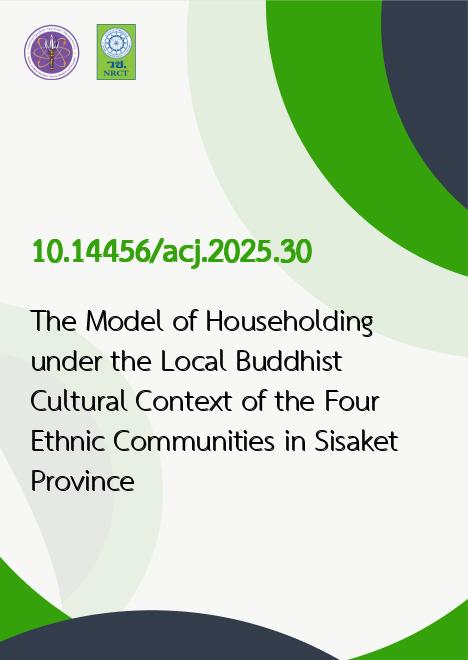
|
The Model of Householding under the Local Buddhist Cultural Context of the Four Ethnic Communities in Sisaket Province |
|---|---|
| รหัสดีโอไอ | |
| Creator | Phra Seksan Thanayutto (Sriton) |
| Title | The Model of Householding under the Local Buddhist Cultural Context of the Four Ethnic Communities in Sisaket Province |
| Contributor | Thaweesak Thongthip, Thanarat Sa-ard-iamand, Patchavat Suksen |
| Publisher | The Office of Arts and Culture, Surindra Rajabhat University |
| Publication Year | 2568 |
| Journal Title | Arts and Culture Journal of the Lower Moon River |
| Journal Vol. | 14 |
| Journal No. | 2 |
| Page no. | 411-421 |
| Keyword | Patterns, Household, Local Culture, Buddhist Perspective, Four Tribes Community |
| URL Website | https://so07.tci-thaijo.org/index.php/acj |
| Website title | วารสารศิลปะและวัฒนธรรมลุ่มแม่น้ำมูล |
| ISSN | ISSN 2822 - 0617 (Online);ISSN 2822 - 1141 (Print) |
| Abstract | This study investigates the circumstances and patterns of Buddhism's influence on the living conditions and local cultural practices of four tribal communities in Sisaket Province, Thailand. Employing a qualitative research methodology, the study integrates in-depth interviews and focus group discussions conducted across the Kuy Suea, Khmer, Lao, and Yer ethnic groups. Analytical strategies included thematic and contextual content analysis. Research findings reveal that these communities consistently uphold Buddhist teachings, rituals. and ancestral practices, which shape their values, moral perspectives, customs, and social norms. These Buddhist influences are manifested in daily life and familial interactions, forming household living patterns deeply rooted in faith and guided by four core Buddhist principles : moral teachings Koti Dhamma, ethical conduct Neti Dhamma, material culture Vattu Dhamma, and social harmony Saha Dhamma. These elements contribute to the collective identity of the tribal communities, reflected in communal activities and a peaceful coexistence within a multicultural social landscape. The study concludes with policy recommendations to support culturally appropriate adaptations of tribal living conditions. It emphasizes three core dimensions of cultural impact : traditional values and moral codes, customary practices, and collective community rituals. |